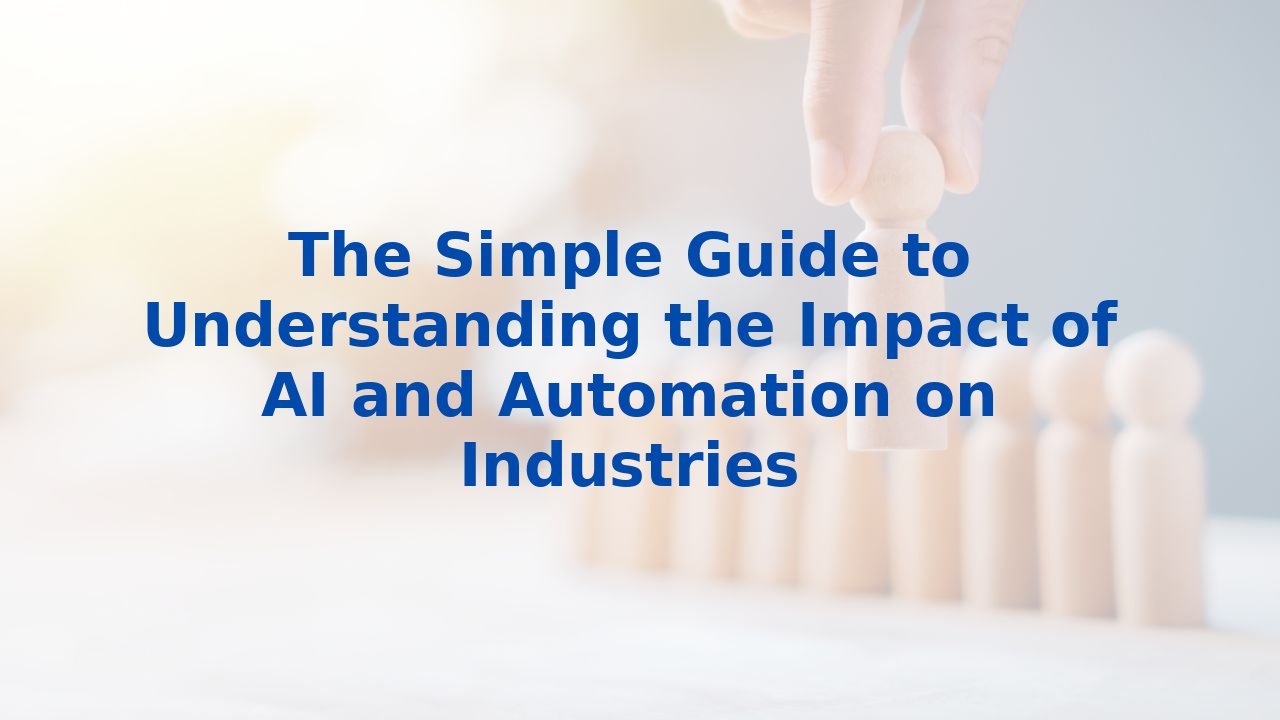The Simple Guide to Understanding the Impact of AI and Automation on Industries
The Simple Guide to Understanding the Impact of AI and Automation on Industries
Introduction
Artificial intelligence (AI) and automation are not just buzzwords; they are the driving forces reshaping industries at a swift pace. The way businesses operate, interact with their customers, and make decisions is undergoing a profound transformation. In this guide, we will explore the multifaceted impact of AI and automation across various sectors, emphasizing the efficiency benefits while acknowledging the challenges that accompany these advancements.
Enhancing Efficiency with AI
At the heart of AI's promise is its ability to enhance organizational efficiency. Automation of repetitive tasks allows human resources to redirect their energies toward more strategic, intricate, and creative endeavors. Imagine a scenario where data entry, customer queries, or even content creation can be efficiently handled by AI systems. This not only accelerates processes but also cultivates an environment where employees can thrive in higher-value roles.
Benefits of AI for Industries
AI's application across different industries unveils a host of benefits that can transform operations. Here are some of the critical advantages:
1. Data Analysis and Insights
The ability of AI to analyze vast datasets swiftly and accurately provides businesses with insights that might elude human analysts. In sectors like finance, healthcare, and retail, data-driven decision-making becomes not just beneficial, but essential.
2. Customer Service
AI-driven chatbots and virtual assistants are revolutionizing customer service, offering 24/7 support. This immediacy improves response times and bolsters customer satisfaction, particularly vital in service-centric fields like hospitality and e-commerce.
3. Predictive Maintenance
In industries such as manufacturing and logistics, AI's ability to predict equipment failures minimizes downtime and boosts operational efficiency. By anticipating needs, companies can shift from reactive to proactive maintenance strategies.
4. Content Creation
Automated systems can generate a range of content, from blog posts to social media updates. For marketing and media industries, this means saving both time and human resources without compromising quality.
5. Supply Chain Optimization
AI optimizes logistics by analyzing supply chain data, which helps reduce costs and improve delivery times—critical aspects for transportation and warehousing sectors.
Challenges and Considerations
While the advantages of AI are compelling, the transition does bring certain challenges that industries must navigate:
1. Job Displacement
As tasks become automated, there's a risk of job displacement in roles centered around repetitive tasks. To combat this, businesses need to invest in retraining programs, assuring employees that their skills will remain relevant in an AI-enhanced workplace.
2. Ethical Concerns
AI systems can unintentionally perpetuate biases if trained on skewed data. It’s imperative that organizations prioritize transparency and fairness within their AI frameworks to avoid discriminatory practices.
3. Cybersecurity
The rise of AI and automation introduces a new layer of cybersecurity risks. As operations become more digitized, robust security measures are essential to protect systems and sensitive data.
Training Employees for AI
To harness the full potential of AI, organizations must prioritize employee training. This can encompass:
1. AI Literacy
Understanding the capabilities and limitations of AI tools helps employees collaborate effectively within these technological frameworks.
2. Data Science
Fostering skills in data science enables employees to comprehend and utilize insights generated by AI systems to make informed decisions.
3. Creativity and Adaptability
As industries evolve, so too must the workforce. Encouraging creativity and adaptability prepares employees for roles requiring strategic thinking and innovative solutions.
4. Ethics and Bias Awareness
Raising awareness about ethical considerations and bias in AI is crucial. Organizations must empower employees to use AI responsibly, ensuring technologies enhance, rather than detract from, workplace integrity.
Conclusion
The integration of AI and automation is not just a trend; it’s a fundamental shift in how industries operate. Enhanced efficiency and improved decision-making are among the myriad benefits, yet challenges remain. By committing to employee training and promoting ethical practices, organizations can navigate these hurdles effectively. Embracing AI and automation isn’t merely a strategy for survival; it's a blueprint for sustainable success in a rapidly evolving business landscape. As industries adapt and innovate, the future belongs to those who are ready to harness the potential of AI.



